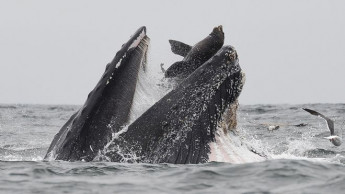whale
Rare Whale Likely Died from Head Injuries: NZ Scientists
Scientists suspect the first complete specimen ever recorded of the world’s rarest whale died from head injuries, an expert said Friday.
The first dissection of a spade-toothed whale, a type of beaked whale, was completed last week after a painstaking examination at a research center near the New Zealand city of Dunedin, the local people who led the scientific team, Te Rūnanga Ōtākou, said in a statement issued by the New Zealand Department of Conservation.
A near-perfectly preserved 5-meter (16-foot) male was found washed up on a South Island beach in July. It was the first complete specimen ever recorded. There have only been seven known sightings and never of a living spade-toothed whale.
Scientists gather to decode puzzle of the world's rarest whale in 'extraordinary' New Zealand study
New Zealand conservation agency beaked whale expert Anton van Helden said the whale’s broken jaw and bruising to the head and neck led scientists to believe that head trauma may have caused its death.
“We don’t know, but we suspect there must have been some sort of trauma, but what caused that could be anyone’s guess,” van Helden said in a statement.
All varieties of beaked whales have different stomach systems and researchers didn’t know how the spade-toothed type processed its food.
The scientific team found the specimen had nine stomach chambers containing remnants of squid and parasitic worms, the statement said.
Among the more interesting finds were tiny vestigial teeth in the upper jaw.
“These little teeth embedded in the gum tells us something about their evolutionary history. It’s remarkable to see this and it’s just another thing that we had no idea about,” van Helden said.
“It’s a week I’ll never forget in my life, it’s certainly a highlight and it’s the start of the storytelling around this beautiful animal,” van Helden added.
The dissection was also notable because scientists and curators worked together with local Māori people to incorporate Indigenous knowledge and customs into each step of the process.
Following the dissection, the local iwi, or tribe, will keep the jawbone and teeth of the whale before its skeleton is displayed in a museum. 3D printing will be used to replicate those parts retained by the iwi.
To Māori, whales are a taonga -– a precious treasure -– and the creature has been treated with the reverence afforded to an ancestor.
New Zealand is a whale-stranding hotspot, with more than 5,000 episodes recorded since 1840, according to the Department of Conservation.
The first spade-toothed whale bones were found in 1872 on New Zealand’s Pitt Island. Another discovery was made at an offshore island in the 1950s, and the bones of a third were found on Chile’s Robinson Crusoe Island in 1986.
1 year ago
Baleen whale, dolphin carcass wash ashore on Kuakata beach
A large Baleen species whale and a dolphin carcass washed ashore on Kuakata beach in Patuakhali on Saturday.
The whale was 30 feet long and 6 feet in width while the dolphin was around 5 feet long and 1.5 feet in width, said Ruman Imtiaz Tushar, leader of Patuakhali Dolphin conservation Team.
The decomposed whale was noticed around 9 am near Jhau bagan point and then the dolphin carcass found around 12 pm near Tourism Park area on the beach, he said.
Read: Whale carcass washes ashore on Cox’s Bazar beach
Abul Kalam, range officer of Mohipur Forest Department said after being informed by locals forest officers have been sent to the spot to collect samples and bury the decomposed carcasses.
3 years ago
Whale carcass washes ashore on Cox’s Bazar beach
The carcass of a humpback whale washed ashore on the Himchhari beach adjacent to Cox’s Bazar-Teknaf marine drive on Friday morning.
Locals found the rotting carcass when the tide was receding.
“We suspect that the whale died a week ago. Samples from the carcass have been collected for tests. The reason behind its death can be known after a necropsy,” said SM Khalequzzaman, the Cox’s Bazar District Fisheries Officer.
Read Dead tiger’s autopsy done in Bagerhat
The 44 feet long whale is believed to be about 17 years old, said marine biologist Jahirul Islam.
Khalequzzaman said this species is seen in the Bay in the south-western part of the Sundarbans.
The last time a whale washed ashore here was in 2008. In 1991, another whale carcass had washed ashore on Laboni beach.
Additional Deputy Commissioner Amin Al Parvez told reporters that they would try to determine the cause of the whale’s death and bury it as soon as possible.
Read Whale 'swallows' sea lion: 'It was a once-in-a-lifetime event'
4 years ago
Whale 'swallows' sea lion: 'It was a once-in-a-lifetime event'
Dhaka, July 31 (UNB) - Chase Dekker believes the photo he took of a humpback whale "swallowing" a sea lion is the first time that happening has ever been caught on camera, reports the BBC.
6 years ago


.jpg)



